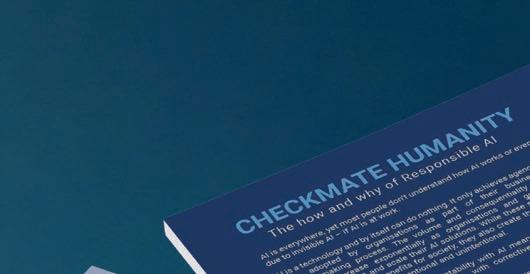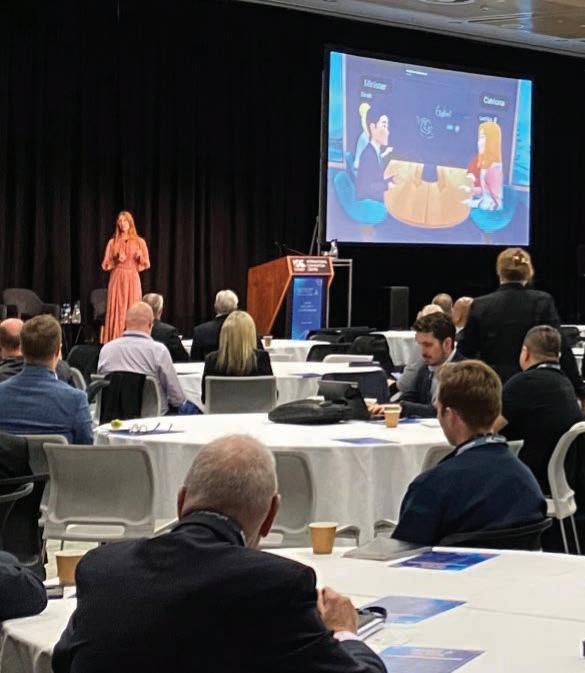
4 minute read
CHECKMATE HUMANITY
The How and Why of Responsible AI
Artifi cial Intelligence (AI) is the fastest growing technology sector in the world, valued at US$59.67 billion in 2021. It is estimated to expand at a compound annual growth rate of 39.4 percent to reach US$422.37 billion by 2028.
Annual growth rate of 39.4%
to reach us $422.37b
by 2028
There is no question that AI is changing the way individuals, organisations, governments and society work and live. But will AI be ethical and how responsible will it be? And what does this even mean?
The book Checkmate Humanity: the how and why of responsible AI introduces the world’s fi rst taxonomy of AI harms and then off er solutions and recommendations so that we can build a Responsible AI future.
As laws and regulations play catch-up, the growth in AI begs many questions about safety, security and reliability. This book sets out to answer questions about ethics and responsibility and maps the potential harms that AI may cause from individual harms right through to full existential risk.
According to Louis Rosenberg, CEO & Chief Scientist, Unanimous AI, “AI systems are learning to master the game of humans. Researchers around the world are developing AI systems to out-think-us, out-negotiate us, and out-maneuver us. Is there anything we can do to protect ourselves?
We certainly can’t stop AI from getting more powerful. And while many are working to put safeguards in place, there’s a notable lack of urgency, especially in industry. Which is why this book, Checkmate Humanity, is so important – it clearly conveys the very real risks of AI and the urgent need for proactive measures.”




About the Authors
Checkmate Humanity seeks to explain what AI is, why you need to know about it and how to do it. Written by high profi le activists in the Responsible AI fi eld, the book is suitable for executives, boards, managers, leaders, academics, startups, investors, students and just about anyone who needs to know how to do AI responsibly.
Checkmate Humanity: the how and why of responsible AI is authored by Dr Catriona Wallace, Founder, Responsible Metaverse Alliance, Adj. Professor, UNSW, Dr Sam Kirshner, Associate Professor of Business Analytics at the UNSW, and Prof Richard Vidgen, Emeritus Professor Richard Vidgen, Emeritus Professor of Business Analytics at the UNSW of Business Analytics at the UNSW Business School, Emeritus Professor Business School, Emeritus Professor of Systems Thinking at the University of Systems Thinking at the University of Hull, UK, and a visiting professor at of Hull, UK, and a visiting professor at the University of the Creative Arts, UK. the University of the Creative Arts, UK.
Other contributors include Other contributors include Tiberio Caetano, Rumtin Sepasspour, Tiberio Caetano, Rumtin Sepasspour, Kimberlee Weatherall, Chris Dolman, Jenny L. Davis and Simon Dolman, Jenny L. Davis and Simon O’Callaghan.
MORE INFO
Checkmate Humanity: the how and why of responsible AI is available for purchase at checkmatehumanity.com

Dr Catriona Wallace address at the ASIAL Security 2022 Conference

Dr Catriona Wallace
Dr Catriona Wallace is a specialist in the fi eld of Artifi cial Intelligence and the Metaverse. She has been recognised by The Australian Financial Review as the most infl uential woman in business & entrepreneurship and by the Royal Institution of Australia as a pre-eminent scientist. Catriona is an Adjunct Professor and is one of the world’s most cited experts in Artifi cial Intelligence, Responsible Technology, the Metaverse and the Future of Work. Dr Wallace is the Founder of the Responsible Metaverse Alliance, Director of the Gradient Institute, Founder of Ethical AI Advisory, Chair of Venture Capital fund Boab AI, Director of the Garvan Institute and the Founder of a Machine-Learning company based out of New York. Catriona is a champion of women, diversity & inclusion and ethics and has a PhD in Organizational Behaviour.
Dr Sam Kirshner
Dr Sam Kirshner is an Associate Professor of Business Analytics at the University of New South Wales. Sam teaches data visualisation, predictive analytics, and responsible AI to undergraduates, postgraduates, and MBAs and co-authored the textbook Business Analytics: A Management Approach.
Prof Richard Vidgen
Prof Richard Vidgen is Emeritus Professor of Business Analytics at the University of New South Wales Business School, Emeritus Professor of Systems Thinking at the University of Hull, UK, and a visiting professor at the University of the Creative Arts, UK. Prior to becoming an academic, Richard had an extensive career in industry, working for a U.S. software company, as an IT consultant in the fi nance and banking sector, and as a software development manager for a major UK bank.






